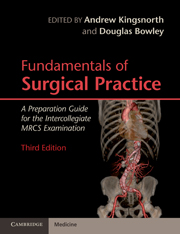Book contents
- Frontmatter
- Contents
- List of contributors
- Preface
- Section 1 Basic Sciences Relevant to Surgical Practice
- Section 2 Basic Surgical Skills
- Section 3 The Assessment and Management of the Surgical Patient
- Section 4 Perioperative Care of the Surgical Patient
- Section 5 Common Surgical Conditions
- 16 Assessment and early treatment of patients with trauma
- 17 Fundamentals of the central nervous system
- 18 Fundamentals of head and neck surgery
- 19 Fundamentals of thoracic surgery
- 20 Oesophago-gastric surgery
- 21 Fundamentals of hepatobiliary and pancreatic surgery
- 22 Fundamentals of endocrine surgery
- 23 Fundamentals of the breast
- 24 Lower gastrointestinal surgery
- 25 Fundamentals of the genitourinary system
- 26 Hernias
- 27 Fundamentals of vascular surgery
- 28 Fundamentals of orthopaedics
- 29 Fundamentals of plastic surgery
- 30 Surgical care of the paediatric patient
- 31 Fundamentals of organ transplantation
- Index
- References
30 - Surgical care of the paediatric patient
Published online by Cambridge University Press: 03 May 2011
- Frontmatter
- Contents
- List of contributors
- Preface
- Section 1 Basic Sciences Relevant to Surgical Practice
- Section 2 Basic Surgical Skills
- Section 3 The Assessment and Management of the Surgical Patient
- Section 4 Perioperative Care of the Surgical Patient
- Section 5 Common Surgical Conditions
- 16 Assessment and early treatment of patients with trauma
- 17 Fundamentals of the central nervous system
- 18 Fundamentals of head and neck surgery
- 19 Fundamentals of thoracic surgery
- 20 Oesophago-gastric surgery
- 21 Fundamentals of hepatobiliary and pancreatic surgery
- 22 Fundamentals of endocrine surgery
- 23 Fundamentals of the breast
- 24 Lower gastrointestinal surgery
- 25 Fundamentals of the genitourinary system
- 26 Hernias
- 27 Fundamentals of vascular surgery
- 28 Fundamentals of orthopaedics
- 29 Fundamentals of plastic surgery
- 30 Surgical care of the paediatric patient
- 31 Fundamentals of organ transplantation
- Index
- References
Summary
Introduction
Paediatric surgery has developed as a specialty based on the facts that infants and children are different from adults. They differ in their anatomy, physiology and psychology. Unlike adults, children are growing organisms. Children also differ in the diseases they encounter: congenital anomalies (Figure 30.1) are common whereas malignancies are less common, and degenerative diseases are rare.
Paediatric surgery is a broad specialty that is defined by age rather than by organ systems. There are two levels of specialization: specialist paediatric surgery and general paediatric surgery.
Specialist paediatric surgery consists of:
neonatal surgery from birth to postconceptional age of 44 weeks
surgery of major or complex conditions in infants and older children, including neoplasms, hepatobiliary diseases, specialized gastrointestinal conditions, thoracic anomalies, major trauma, etc.
paediatric urology.
General paediatric surgery encompasses relatively common and less demanding disorders, including elective conditions such as inguinal hernia and emergency conditions such as appendicitis in older children.
The outcome of infants and children requiring surgery has improved enormously in recent years as a result of a better understanding of the physiology of children, improvement of surgical techniques, advances in paediatric anaesthesia and intensive care and the adoption of a multidisciplinary approach. Attention to the psychological needs of children, involvement of the family in the management process and more effective postoperative pain relief enhance the quality of care for these children.
- Type
- Chapter
- Information
- Fundamentals of Surgical PracticeA Preparation Guide for the Intercollegiate MRCS Examination, pp. 564 - 607Publisher: Cambridge University PressPrint publication year: 2011

